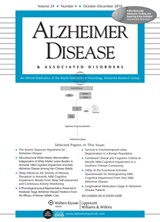Alzheimer Disease and Associated Disorders
Alzheimer's Disease and Associated Disorders is a broad term encompassing the range of cognitive impairments and neurodegenerative conditions primarily affecting older adults, with Alzheimer's disease (AD) being the most prominent and common form. This article provides an overview of Alzheimer's disease, its associated disorders, symptoms, diagnosis, and management strategies.
Overview[edit | edit source]
Alzheimer's disease is a progressive neurodegenerative disorder characterized by the deterioration of cognitive functions, notably memory, thinking, and reasoning skills. It is the most common cause of dementia among older adults, contributing to 60-70% of cases. The disease is named after Dr. Alois Alzheimer, who first described it in 1906.
Symptoms[edit | edit source]
The symptoms of Alzheimer's disease and associated disorders vary but generally include:
- Memory loss that disrupts daily life
- Challenges in planning or solving problems
- Difficulty completing familiar tasks
- Confusion with time or place
- Trouble understanding visual images and spatial relationships
- New problems with words in speaking or writing
- Misplacing things and losing the ability to retrace steps
- Decreased or poor judgment
- Withdrawal from work or social activities
- Changes in mood and personality
Causes and Risk Factors[edit | edit source]
The exact cause of Alzheimer's disease is not fully understood, but it is believed to result from a combination of genetic, lifestyle, and environmental factors that affect the brain over time. Key risk factors include:
- Age
- Family history and genetics
- Down syndrome
- Head injuries
- Heart health
Pathophysiology[edit | edit source]
Alzheimer's disease is characterized by the accumulation of amyloid beta plaques and tau tangles in the brain, leading to neuronal damage and loss. This process results in a decline in neurotransmitters, which are chemicals in the brain that facilitate communication between nerve cells, ultimately impairing cognitive functions.
Diagnosis[edit | edit source]
Diagnosing Alzheimer's disease involves a comprehensive evaluation, including:
- Patient history
- Physical and neurological exams
- Cognitive and neuropsychological tests
- Brain imaging (MRI or CT scan)
- Laboratory tests
Treatment and Management[edit | edit source]
While there is no cure for Alzheimer's disease, several strategies can help manage symptoms and improve quality of life. These include:
- Medications (e.g., cholinesterase inhibitors, memantine)
- Cognitive therapy
- Behavioral therapy
- Support for caregivers
Associated Disorders[edit | edit source]
Several disorders are associated with Alzheimer's disease, including:
Prevention[edit | edit source]
Preventive measures for Alzheimer's disease and associated disorders focus on maintaining a healthy lifestyle, such as:
- Regular physical exercise
- A healthy diet
- Cognitive training
- Social engagement
- Managing cardiovascular risk factors
Conclusion[edit | edit source]
Alzheimer's disease and associated disorders represent a significant challenge to public health, affecting millions of individuals and their families worldwide. Ongoing research aims to better understand these conditions, develop effective treatments, and ultimately find a cure.
Search WikiMD
Ad.Tired of being Overweight? Try W8MD's physician weight loss program.
Semaglutide (Ozempic / Wegovy and Tirzepatide (Mounjaro / Zepbound) available.
Advertise on WikiMD
|
WikiMD's Wellness Encyclopedia |
| Let Food Be Thy Medicine Medicine Thy Food - Hippocrates |
Translate this page: - East Asian
中文,
日本,
한국어,
South Asian
हिन्दी,
தமிழ்,
తెలుగు,
Urdu,
ಕನ್ನಡ,
Southeast Asian
Indonesian,
Vietnamese,
Thai,
မြန်မာဘာသာ,
বাংলা
European
español,
Deutsch,
français,
Greek,
português do Brasil,
polski,
română,
русский,
Nederlands,
norsk,
svenska,
suomi,
Italian
Middle Eastern & African
عربى,
Turkish,
Persian,
Hebrew,
Afrikaans,
isiZulu,
Kiswahili,
Other
Bulgarian,
Hungarian,
Czech,
Swedish,
മലയാളം,
मराठी,
ਪੰਜਾਬੀ,
ગુજરાતી,
Portuguese,
Ukrainian
Medical Disclaimer: WikiMD is not a substitute for professional medical advice. The information on WikiMD is provided as an information resource only, may be incorrect, outdated or misleading, and is not to be used or relied on for any diagnostic or treatment purposes. Please consult your health care provider before making any healthcare decisions or for guidance about a specific medical condition. WikiMD expressly disclaims responsibility, and shall have no liability, for any damages, loss, injury, or liability whatsoever suffered as a result of your reliance on the information contained in this site. By visiting this site you agree to the foregoing terms and conditions, which may from time to time be changed or supplemented by WikiMD. If you do not agree to the foregoing terms and conditions, you should not enter or use this site. See full disclaimer.
Credits:Most images are courtesy of Wikimedia commons, and templates, categories Wikipedia, licensed under CC BY SA or similar.
Contributors: Prab R. Tumpati, MD

